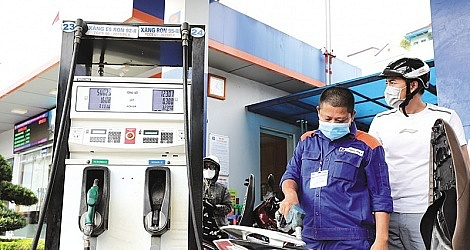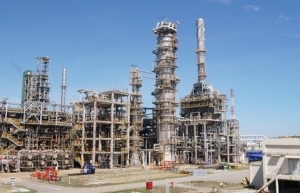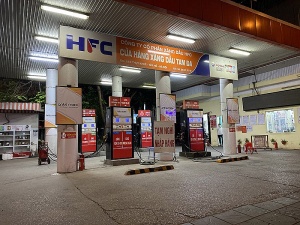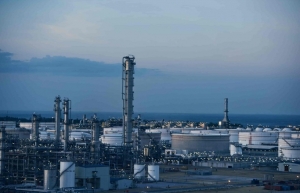MoIT and MoF discuss seven petroleum market issues
 |
After almost a year of putting Resolution No.499 dated March 28, 2022 into action, Minister of Industry and Trade Nguyen Hong Dien gave the following report on the MoIT's progress and results early this week.
The first duty afforded to the ministry is to secure the fuel supply. Petrol prices have climbed and fluctuated erratically for an extended period of time since the start of last year, posing several concerns for businesses. The dollar exchange rate and credit interest rates have continued to increase, while the corporate bond market has collapsed.
"Businesses have had difficulty gaining access to foreign currency credit sources because they do not fulfil the requirements for loans and bank guarantees. This hinders their growth and their ability to purchase petrol and oil," said Dien.
The supply interruption at Nghi Son Refinery and Petrochemical (NSRP) over the new year period that affected domestic petroleum output also contributed to these concerns.
Secondly, it needs to restrict petroleum product price increases. The MoIT and Ministry of Finance (MoF) regulate domestic fuel prices in accordance with government decrees 83 and 95, assuring conformity with global petroleum price fluctuations.
The minister stated the MoIT recommends minimising some taxes in the petrol pricing scheme in the hope of regulating a steady rise in domestic prices.
"This should assist in the control of inflation and promote economic recovery and innovation, while achieving consensus among business entities and consumers alike," he added.
The third duty addresses the NSRP issue. The company's primary challenge is financial. To address these issues, the parties supplying money to the project, the refinery, and its financing banks are actively discussing a suitable financial restructuring plan.
The MoIT is now cooperating with the Commission for the Management of State Capital at Enterprises and following the prime minister's directions to eliminate obstacles for the plant, thereby maintaining a steady domestic petroleum supply.
Fourthly, the MoIT has presented plans to the prime minister to improve the levels of the national petroleum reserve. According to the new strategy, the national petroleum reserve will be raised from the equivalent of nine days worth of net import to 15 days by 2025, and then to 30 days by 2030. The state budget must invest at least $172 million per year for the acquisition of petroleum reserves to execute this plan.
The state budget currently allocates around $62 million per year for the reserve and according to the MoF's assessment, this new level of funding will exceed the state's capacity to maintain a balanced budget.
Currently, the state does not have a domestic petroleum resource, so it must lease from private companies. To expand the reserve to the intended levels, Dien said the ministry has submitted a report to the prime minister and met with the MoF to agree to negotiate deals with the firms that own the resources to ensure that the national petroleum reserve initiative is not disrupted
The fifth duty concerns the application of sci-tech within the petroleum sector, and the national database on petroleum company operation and management that went live in January. Minister Dien expects to conduct a performance review to improve the system and extend the scope of the management application to include fuel and oil retail locations nationally.
Issue number six regards the oversight of the petroleum industry. There are 33 major companies in Vietnam that import and trade petroleum. The MoIT has issued 15 public notifications and several papers connected to market management and intensifying the inspection and supervision of distribution and trade.
Minister Dien said that in 2022, and over the first two months of this year, "The ministry's market management force oversaw approximately 17,000 petrol and oil retail outlets, inspected and analysed more than 2,700 transactions, and issued fines exceeding $842,000 in over 600 cases nationwide."
Lastly, the MoIT is to concern itself with reforming the rules surrounding petroleum trade in Vietnam. The MoIT has prioritised reform since the start of 2022, preparing a draught decree to revise and augment decrees 83 and 95.
"In addition to its accomplishments, the ministry has to concentrate on overcoming some deficiencies and constraints in order to execute its duties and responsibilities more effectively," said Dien.
 | MoF proposes to reduce tax for input material of petrol products to 10% The Ministry of Finance (MoF) has proposed to reduce the most-favoured-nation (MFN) tariff for some kinds of gasoline products used as input materials for production of other products from 20 per cent to 10 per cent to reduce the price of input materials. |
 | Ensuring steady supply of oil and gasoline till the year-end The Ministry of Industry and Trade and other relevant ministries will take measures to ensure the supply of oil and petrol in the last months of 2022 while adjusting the policies to support businesses. |
 | Gasoline market under pressure ahead of November 21 operating period Due in part to Nghi Son Refinery & Petrochemical's financial and capital losses, people are still struggling to buy gasoline. |
What the stars mean:
★ Poor ★ ★ Promising ★★★ Good ★★★★ Very good ★★★★★ Exceptional
 Tag:
Tag:
Related Contents
Latest News
More News
- PM outlines new tasks for healthcare sector (February 25, 2026 | 16:00)
- Ho Chi Minh City launches plan for innovation and digital transformation (February 25, 2026 | 09:00)
- Vietnam sets ambitious dairy growth targets (February 24, 2026 | 18:00)
- Masan Consumer names new deputy CEO to drive foods and beverages growth (February 23, 2026 | 20:52)
- Myriad risks ahead, but ones Vietnam can confront (February 20, 2026 | 15:02)
- Vietnam making the leap into AI and semiconductors (February 20, 2026 | 09:37)
- Funding must be activated for semiconductor success (February 20, 2026 | 09:20)
- Resilience as new benchmark for smarter infrastructure (February 19, 2026 | 20:35)
- A golden time to shine within ASEAN (February 19, 2026 | 20:22)
- Vietnam’s pivotal year for advancing sustainability (February 19, 2026 | 08:44)






















 Mobile Version
Mobile Version